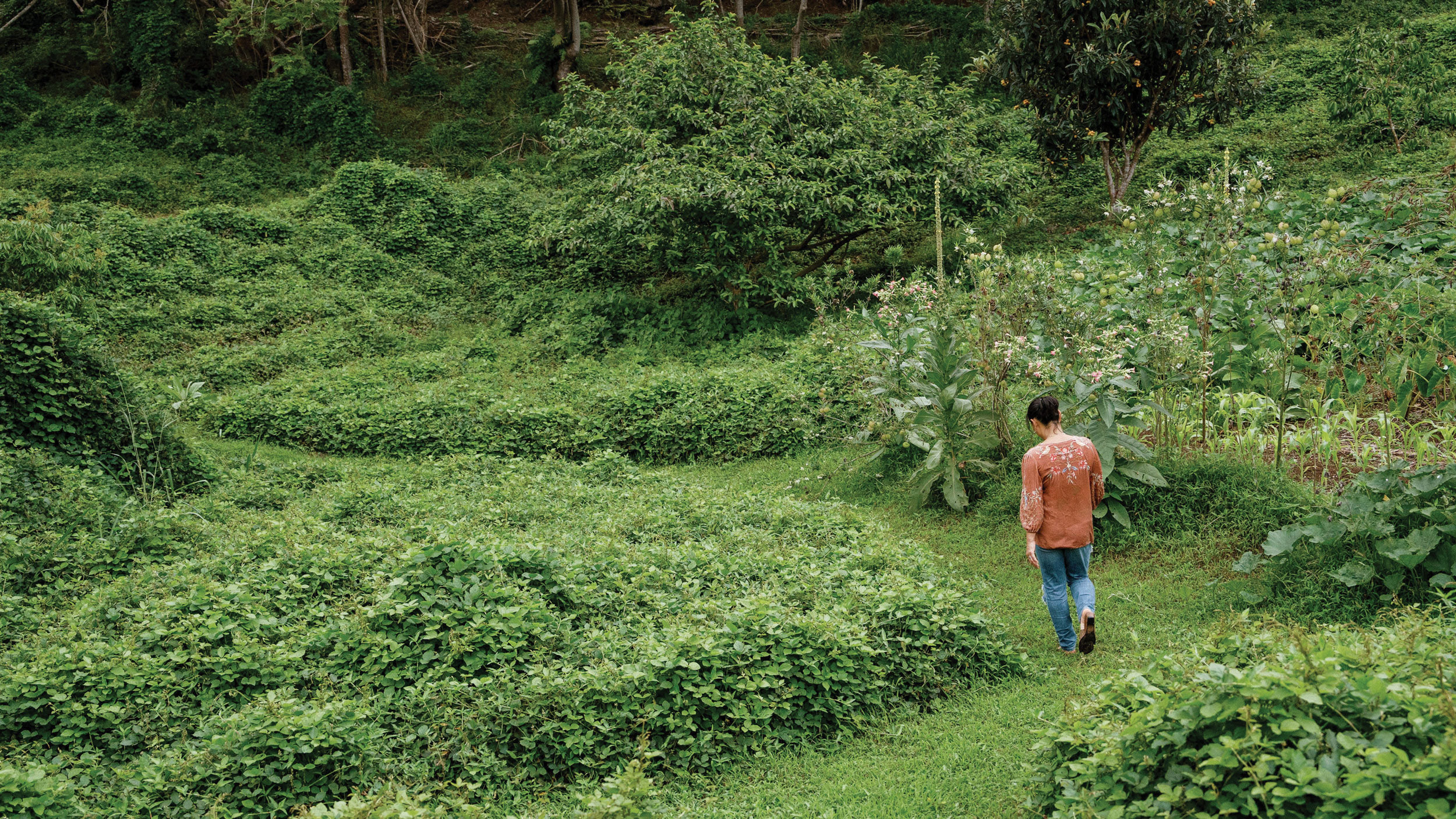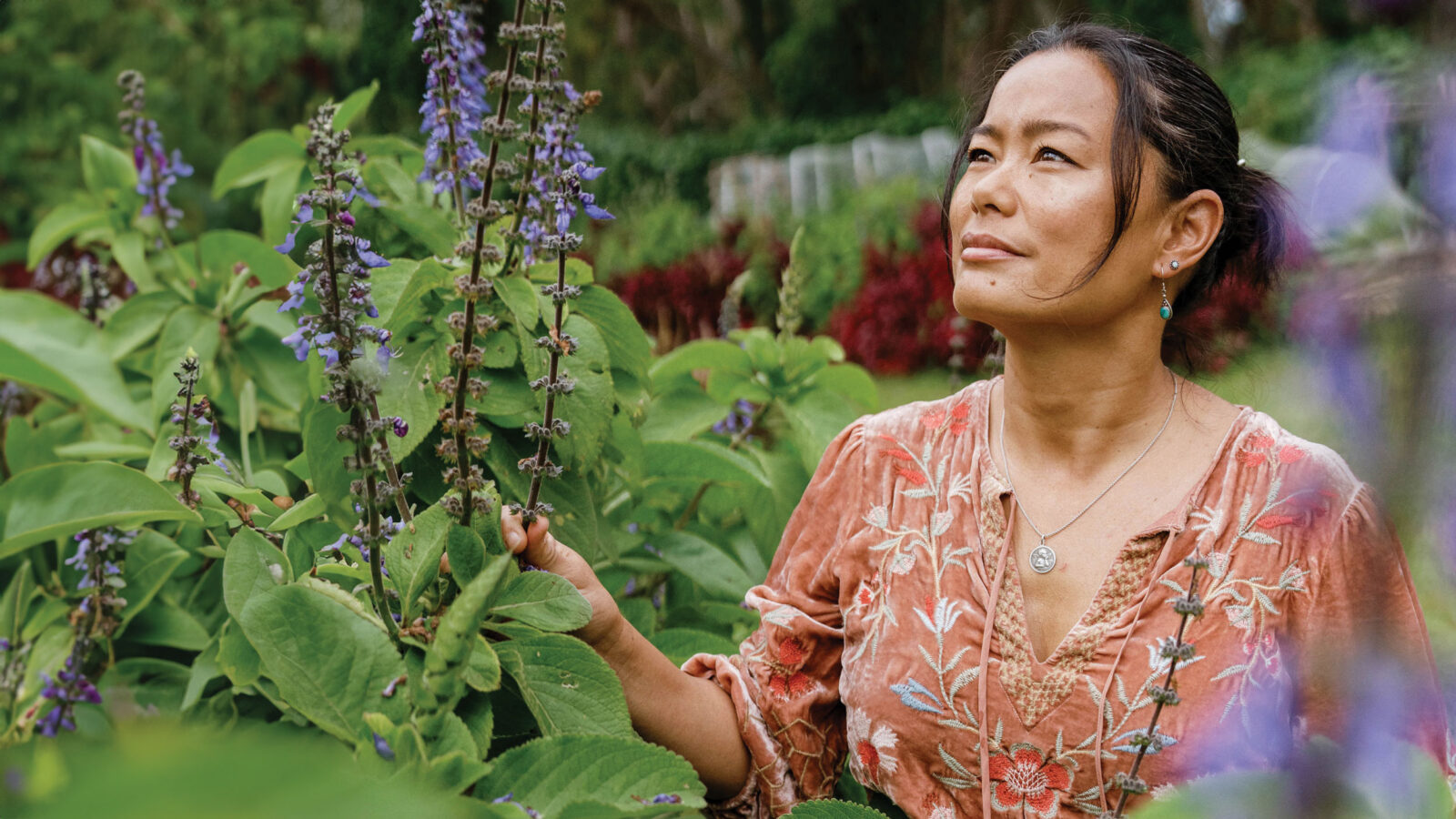By founding the Akahiao Nature Institute, Julie Rogers ’98 is helping young people live in harmony with nature
Julie Rogers ’98 was on a clear career path: a biomedical engineering degree from Tufts University hung on her wall, and she was in her third year working at the Broad Institute in Cambridge, Massachusetts. But a career and a calling are two very different things, and when Rogers heard the voice of her adopted home, Hawaii, echoing in her ear back in 2005—she started listening.
Rogers is now the Founder and Executive Director of the Akahiao Nature Institute, which she started in 2018, on the big island of Hawaii. Her goal? To help remind young people of the natural world and our place in it. She and her five-person team try to accomplish this in two primary ways: through overnight programs targeted toward adolescents and teenagers, and a new full-time preschool program.
“We’re trying to create a future where humans live together with nature in a harmonious way,” Rogers says from her front porch on the Huehue Ranch, her family’s 140-plus-acre property that she is transforming into an educational campus. Her team of teachers sets out to make that connection by trying to live life in tune with the way Indigenous people of Hawaii once lived. “The Indigenous people lived with nature in a way that didn’t destroy it, or put us in the situation we are in right now,” she says. “I created this school so we can educate [students] about how to live with the Earth in a way that’s good for us and good for it.”
Visitors to Akahiao come from all over. Rogers serves the local population and other Americans, but also has developed a relationship with a Japanese high school that sends kids twice a year to Akahiao programs (Rogers was born in Japan and attended school there). But no matter where kids come from, Rogers aims to help them reconnect with the planet by spending time outside. On the ranch farm, students can harvest fresh fruits and veggies, then sit down for a multicourse meal sourced from local ingredients. They hike, explore, practice archery, and participate in hands-on service projects. In the preschool, kids learn from being outside and seeing the world unfold—such as watching a caterpillar go from cocoon to butterfly—and many other hands-on activities.
Rogers’ desire to help foster these connections has existed for a long time. As a kid, she split time between Japan and the U.S., and had a varied educational experience to show for it. When she arrived at Williston in 11th grade, it was Rogers’ first experience living away from her family. “Being exposed to people from all different walks of life helped keep my worldview really wide,” she says. It also showed her that, despite how different everyone is, “we’re all humans,” she says.

Rogers’ decision to leave the scientific research world was spurred in part by her dad’s health scare, which brought her home to Hawaii in 2004. Leaving her lab job, Rogers returned to Hawaii, started doing nonprofit work, and eventually entered a mentorship program called The Tracking Project, which works with traditional Native elders and community educators from numerous cultures to promote natural and cultural awareness of the world. Invigorated by what she was doing, Rogers and her husband, Jeff Fuchs, took the leap and founded Akahiao.
Like most business owners, Rogers found her plans affected by the pandemic. While her original business plan called for expanding into longer, semester-based programs for teens, the pandemic—and the birth of their child, Sebastian—prompted them to aim younger and launch a preschool program. “Our approach is like a scientific inquiry model, where kids are the ones who are asking the questions and creating the programs and projects they want to do.” Looking ahead, Rogers plans to expand the school program to elementary school-aged kids and also dreams of building a camping site further up on the ranch land, to allow for longer stays for older students.
While her vision for Akahiao is clear, Rogers still has moments where she wonders “What if?” about her prior career. The validation comes in seeing the responses—however small they might be in the moment—coming from the visitors. “It makes it worth it,” Rogers says. “Once in a while I go back and think, ‘Did I make the right choice?’ But then I remember I like this way better—because it really feeds my soul in a different way. It’s so rewarding to feel that you’ve done something that can have an exponential difference later.”

